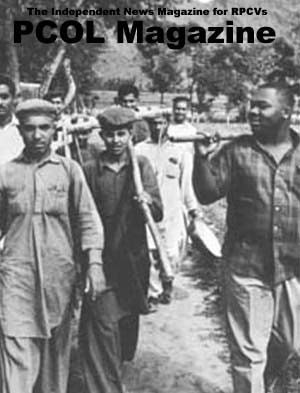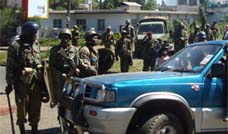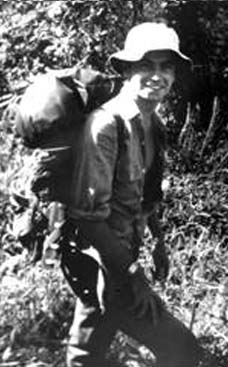2008.01.09: January 9, 2008: Headlines: COS - Liberia: Country Directors - Cameroon: Speaking Out: New York Times: Liberia RPCV Robert L. Strauss writes: Too often young volunteers lack the maturity and professional experience to be effective development workers in the 21st century
Peace Corps Online:
Directory:
Liberia:
Peace Corps Liberia :
Peace Corps Liberia: Newest Stories:
2008.01.09: January 9, 2008: Headlines: COS - Liberia: Country Directors - Cameroon: Speaking Out: New York Times: Liberia RPCV Robert L. Strauss writes: Too often young volunteers lack the maturity and professional experience to be effective development workers in the 21st century
- 2008.01.14: January 14, 2008: Headlines: Figures: COS - Dominican Republic: Politics: Congress: Election2008 - Dodd: New Yokr Times: Senator Chris Dodd writes: Once upon a time, I was one of those inexperienced college recruits Monday, January 14, 2008 - 12:44 pm [1]
- 2008.01.13: January 13, 2008: Headlines: Speaking Out: New York Times: Karen Greiner writes: Today, John Granville, a friend and fellow returned Peace Corps volunteer is being buried in Orchard Park, N.Y. He was murdered while working to end the violence in Sudan. Sunday, January 13, 2008 - 10:13 am [1]
- 2008.01.13: January 13, 2008: Headlines: COS - China: Speaking Out: New York Times: China RPCV Michael Levy writes: Robert L. Strauss' criticism of the Peace Corps is an insult to those who work tirelessly — at great sacrifice and, at times, with little enjoyment — to fulfill their missions Sunday, January 13, 2008 - 10:12 am [1]
- 2008.01.13: January 13, 2008: Headlines: COS - Cameroon: Speaking Out: Early Termination: New York Times: Cameroon RPCV Kelli M. Donley writes: The Peace Corps is a great program in true need of reorganization Sunday, January 13, 2008 - 10:10 am [1]
- 2008.01.13: January 13, 2008: Headlines: Tschetter: COS - India: Speaking Out: New York Times: Peace Corps Director Ron Tschetter writes: The Peace Corps remains true to President John F. Kennedy’s vision articulated in 1961 Sunday, January 13, 2008 - 10:09 am [1]
- 2008.01.13: January 13, 2008: Headlines: COS - Senegal: Speaking Out: New York Times: Senegal RPCV Benjamin Y. Clark writes: The Peace Corps is really more of a cultural-exchange program than an international development organization Sunday, January 13, 2008 - 10:09 am [1]
- 2008.01.13: January 13, 2008: Headlines: Speaking Out: Diplomacy: New York Times: Robert Wong writes: The value of the Peace Corps is that people in other countries who may never have seen a foreigner are happy for the opportunity to ask questions directly to an American Sunday, January 13, 2008 - 10:08 am [1]
- May 1, 2000 - Stanford Magazine: For two years in the late 1970s, I played doctor, courtesy of the Peace Corps, in a remote corner of Liberia, a West African nation founded by freed American slaves by RPCV Robert Strauss Sunday, January 13, 2008 - 5:46 pm [3]
Liberia RPCV Robert L. Strauss writes: Too often young volunteers lack the maturity and professional experience to be effective development workers in the 21st century

For the Peace Corps, the number of volunteers has always trumped the quality of their work, perhaps because the agency fears that an objective assessment of its impact would reveal that while volunteers generate good will for the United States, they do little or nothing to actually aid development in poor countries. The agency has no comprehensive system for self-evaluation, but rather relies heavily on personal anecdote to demonstrate its worth. Every few years, the agency polls its volunteers, but in my experience it does not systematically ask the people it is supposedly helping what they think the volunteers have achieved. This is a clear indication of how the Peace Corps neglects its customers; as long as the volunteers are enjoying themselves, it doesn’t matter whether they improve the quality of life in the host countries. Any well-run organization must know what its customers want and then deliver the goods, but this is something the Peace Corps has never learned.
Liberia RPCV Robert L. Strauss writes: Too often young volunteers lack the maturity and professional experience to be effective development workers in the 21st century
Too Many Innocents Abroad
By ROBERT L. STRAUSS
Published: January 9, 2008
Antananarivo, Madagascar
THE Peace Corps recently began a laudable initiative to increase the number of volunteers who are 50 and older. As the Peace Corps’ country director in Cameroon from 2002 until last February, I observed how many older volunteers brought something to their service that most young volunteers could not: extensive professional and life experience and the ability to mentor younger volunteers.
However, even if the Peace Corps reaches its goal of having 15 percent of its volunteers over 50, the overwhelming majority will remain recently minted college graduates. And too often these young volunteers lack the maturity and professional experience to be effective development workers in the 21st century.
This wasn’t the case in 1961 when the Peace Corps sent its first volunteers overseas. Back then, enthusiastic young Americans offered something that many newly independent nations counted in double and even single digits: college graduates. But today, those same nations have millions of well-educated citizens of their own desperately in need of work. So it’s much less clear what inexperienced Americans have to offer.
The Peace Corps has long shipped out well-meaning young people possessing little more than good intentions and a college diploma. What the agency should begin doing is recruiting only the best of recent graduates — as the top professional schools do — and only those older people whose skills and personal characteristics are a solid fit for the needs of the host country.
The Peace Corps has resisted doing this for fear that it would cause the number of volunteers to plummet. The name of the game has been getting volunteers into the field, qualified or not.
In Cameroon, we had many volunteers sent to serve in the agriculture program whose only experience was puttering around in their mom and dad’s backyard during high school. I wrote to our headquarters in Washington to ask if anyone had considered how an American farmer would feel if a fresh-out-of-college Cameroonian with a liberal arts degree who had occasionally visited Grandma’s cassava plot were sent to Iowa to consult on pig-raising techniques learned in a three-month crash course. I’m pretty sure the American farmer would see it as a publicity stunt and a bunch of hooey, but I never heard back from headquarters.
For the Peace Corps, the number of volunteers has always trumped the quality of their work, perhaps because the agency fears that an objective assessment of its impact would reveal that while volunteers generate good will for the United States, they do little or nothing to actually aid development in poor countries. The agency has no comprehensive system for self-evaluation, but rather relies heavily on personal anecdote to demonstrate its worth.
Every few years, the agency polls its volunteers, but in my experience it does not systematically ask the people it is supposedly helping what they think the volunteers have achieved. This is a clear indication of how the Peace Corps neglects its customers; as long as the volunteers are enjoying themselves, it doesn’t matter whether they improve the quality of life in the host countries. Any well-run organization must know what its customers want and then deliver the goods, but this is something the Peace Corps has never learned.
This lack of organizational introspection allows the agency to continue sending, for example, unqualified volunteers to teach English when nearly every developing country could easily find high-caliber English teachers among its own population. Even after Cameroonian teachers and education officials ranked English instruction as their lowest priority (after help with computer literacy, math and science, for example), headquarters in Washington continued to send trainees with little or no classroom experience to teach English in Cameroonian schools. One volunteer told me that the only possible reason he could think of for having been selected was that he was a native English speaker.
The Peace Corps was born during the glory days of the early Kennedy administration. Since then, its leaders and many of the more than 190,000 volunteers who have served have mythologized the agency into something that can never be questioned or improved. The result is an organization that finds itself less and less able to provide what the people of developing countries need — at a time when the United States has never had a greater need for their good will.
Robert L. Strauss has been a Peace Corps volunteer, recruiter and country director. He now heads a management consulting company.
Links to Related Topics (Tags):
Headlines: January, 2008; Peace Corps Liberia; Directory of Liberia RPCVs; Messages and Announcements for Liberia RPCVs; Country Directors - Cameroon; Speaking Out
When this story was posted in January 2008, this was on the front page of PCOL:





Peace Corps Online The Independent News Forum serving Returned Peace Corps Volunteers 
 | Dodd vows to filibuster Surveillance Act
Senator Chris Dodd vowed to filibuster the Foreign Intelligence Surveillance Act that would grant retroactive immunity to telecommunications companies that helped this administration violate the civil liberties of Americans. "It is time to say: No more. No more trampling on our Constitution. No more excusing those who violate the rule of law. These are fundamental, basic, eternal principles. They have been around, some of them, for as long as the Magna Carta. They are enduring. What they are not is temporary. And what we do not do in a time where our country is at risk is abandon them." |
 | What is the greatest threat facing us now?
"People will say it's terrorism. But are there any terrorists in the world who can change the American way of life or our political system? No. Can they knock down a building? Yes. Can they kill somebody? Yes. But can they change us? No. Only we can change ourselves. So what is the great threat we are facing? I would approach this differently, in almost Marshall-like terms. What are the great opportunities out there - ones that we can take advantage of?" Read more. |
Read the stories and leave your comments.

Some postings on Peace Corps Online are provided to the individual members of this group without permission of the copyright owner for the non-profit purposes of criticism, comment, education, scholarship, and research under the "Fair Use" provisions of U.S. Government copyright laws and they may not be distributed further without permission of the copyright owner. Peace Corps Online does not vouch for the accuracy of the content of the postings, which is the sole responsibility of the copyright holder.
Story Source: New York Times
This story has been posted in the following forums: : Headlines; COS - Liberia; Country Directors - Cameroon; Speaking Out
PCOL40273
53
|
By Anonymous (mail.flmicro.com - 155.212.44.108) on Wednesday, February 06, 2008 - 4:52 pm: Edit Post |
Dear Editor:
I am in my mid 30s and have been nominated to serve in the Peace Corps. I have over 15 years of experience in management and finance and life experience that the majority of fresh out of college volunteers do not have. What I also have is a history.
I am finding that the down fall of being an older volunteer is how difficult it can be to get medical clearance. I am stuck in the limbo that is the mental health screening process and it is proving to be a challenge.
Fresh out of college volunteers who appear to have no prior health history issues are not better qualified to serve, they simply have not reached an age where they have had enough life experience to allow those issues to come to the surface. Most of the people I know who seek therapy as a means of personal growth do so in their 30s or later. The younger volunteers are no less prone to mental health or medical issues, they simply have not yet presented in their lives and therefore have not been documented.
Being an older volunteer puts one at a disadvantage simply because they have a longer medical history. I had a history of mild eating disorder patterns over 15 years ago. That one factor has become a stumbling block in my application process. How many college aged students who volunteer most likely have, to one degree or another, some form of eating disorder symptoms that simply have never been diagnosed or brought to light? I would wager a bet on "many". Perhaps it is due to the common occurrence of such issues in the college environment that so many are able to go for years without diagnoses or treatment. And yet those students are cleared without reservation -- not because they are less at risk, but because their issues have yet to be documented.
I understand the need for screening, but in my experience it seems that the lack of common sense in deferring or denying a candidate based solely on history is not productive and can result in inadvertently turning away valuable and useful volunteers who possess a greater breadth of experience not easily matched by recent graduates.
If the Peace Corps wishes to attract more experienced volunteers, they may wish to revisit how they screen their volunteers and the way in which they treat those who are eager to use their experience to serve in a meaningful and useful way.
|
By Anonymous (mail.flmicro.com - 155.212.44.108) on Wednesday, February 06, 2008 - 4:45 pm: Edit Post |
Dear Editor:
I am in my mid 30s and have been nominated to serve in the Peace Corps. I have over 15 years of experience in management and finance and life experience that the majority of fresh out of college volunteers do not have. What I also have is a history.
I am finding that the down fall of being an older volunteer is how difficult it can be to get medical clearance. I am stuck in the limbo that is the mental health screening process and it is proving to be a challenge.
Fresh out of college volunteers who appear to have no prior health history issues are not better qualified to serve, they simply have not reached an age where they have had enough life experience to allow those issues to come to the surface. Most of the people I know who seek therapy as a means of personal growth do so in their 30s or later. The younger volunteers are no less prone to mental health or medical issues, they simply have not yet presented in their lives and therefore have not been documented.
Being an older volunteer puts one at a disadvantage simply because they have a longer medical history. I had a history of mild eating disorder patterns over 15 years ago. That one factor has become a stumbling block in my application process. How many college aged students who volunteer most likely have to one degree or another some form of Eating Disorders symptoms that simply have never been diagnosed or brought to light? I would wager a bet on "many". Perhaps it is due to the common occurrence of such issues in the college environment that so many are able to go for years without diagnoses or treatment. And yet those students are cleared without reservation -- not because they are less at risk, but because their issues have yet to be documented.
I understand the need for screening, but in my experience it seems that the lack of common sense in deferring or denying a candidate based solely on history is not productive and can result in inadvertently turning away valuable and useful volunteers with a greater breadth of experience not easily matched by recent graduates.
If the Peace Corps wishes to attract more experienced volunteers, they may wish to revisit how they screen their volunteers and the way in which they treat those who are eager to use their experience to serve in a meaningful and useful way.










